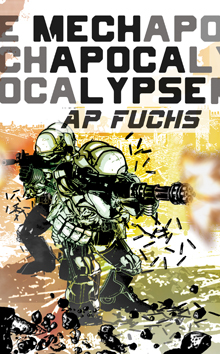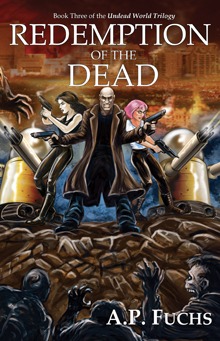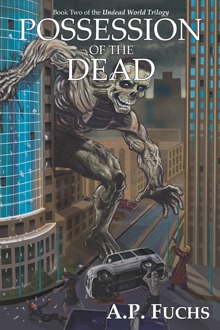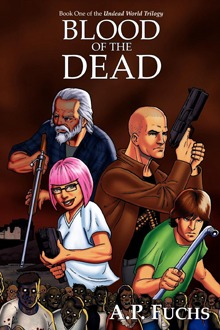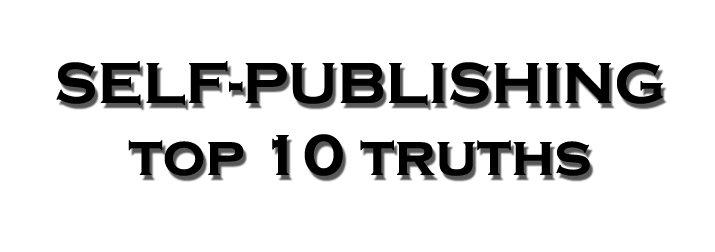Top Ten List of Truths for Self-publishers Part One
Also published at BadRedhead Media here
Self-publishing has been around for a long, long time. In fact, that’s how writers used to publish their work before the whole big trade system came along. Self-publishing has also always—always—been a viable way to make a living as a writer, but the problem was most writers who tried it didn’t execute it properly and ended up losing a ton of money, were taken advantage of by dishonest companies, or simply sat on a pile of books because they didn’t know how to move them.
Or was that just me?
Nowadays, self-publishing is easier than ever before, but like those days long ago, many writers don’t know what to do or where to start, or if they do find information on-line, it’s not always complete. As a ten-year self-publishing veteran and one who has been doing it full time since the spring of 2009 before the indie revolution, there are several truths about long-term self-publishing that I’ve discovered over the years and want to share here.
My Top Ten List of Truths for Self-publishers in no particular order:
1. Self-publishing is completely feasible to make a living at with the proper knowledge.
When I started, I had no idea about the book business, how it worked, who to talk to or what to do other than knew I needed a publisher. After a string of rejection letters, I ended up putting out my first book through a subsidy press. They call themselves “self-publishing houses,” but they’re not. The moment any “publisher” charges a service for a fee, they fall into the category of a subsidy press with you, the writer, subsidizing them. With that press, it cost me around $2500 and all I had to show for it was a badly-written book—with a good story, but terrible writing—and no audience. Despite spamming the news lists in those days—didn’t know any better—nothing really came out of it. Had I done my research into what real self-publishing was, I would’ve found out that it’s not paying someone else to publish your book, but rather covering all the costs yourself, learning how to produce a professional product, and doing all the tasks of a publisher for your own work.
What I should’ve done was:
– spent several evenings combing the Internet researching self-publishing
– read books about self-publishing and learned the requirements
– discovered what legalities might be involved
– learned software
– researched success stories to learn from those who made a go of it and did well, then applied those lessons to my own career
But I didn’t take the time to learn the ropes and paid a high price for it, not just financially, but mentally and emotionally as well.
There’s a cost to self-publishing, but the good news is this cost becomes less and less the more one learns about it. Though I am a firm believer in hands-on learning, even going through trials for some lessons, research and taking one’s time before jumping into the pool is always strongly encouraged.
I wish someone would’ve told me to do the same way back then, so I’m here to tell you—if no one else is—to research, research, research. You’ll save yourself a boatload of headaches and heartaches later if you do.
It’s important to:
– be ready to listen to others who’ve “been there and done that”
– be willing to hear the stuff you want to hear and the stuff you don’t want to hear
– in short, be willing to learn regardless of the lesson. No one is a master right out of the gate, and even those who seem to have perfected a system of publishing are always learning themselves.
2. You need to work hard.
Aside from catching a break and getting caught in Amazon’s “customers who bought this book also bought this other one” loop, or finding yourself a regular on the bestseller lists thus maintaining your visibility, self-publishing is hard work.
Not only do you need to put in the hours to write the actual book, you need to:
– put in the time to perfect the book during the rewrite stages
– the willingness to listen to and work with an editor
– put in the time formatting the book for paperback, eBook and possibly hardcover
– later, to stand out amongst the hundreds of thousands of books published each year, make a solid effort marketing your title so people know about it while you also write and produce the next book
For many writers, if this isn’t their fulltime gig, they find it difficult to maintain a day job, family and put in the time for their writing career. Many quit along the way because the workload-without-always-an-immediate-payoff gets to them and they get discouraged. Understandable, for sure, but sad when they walk away.
You see, the challenges aren’t always a book not selling well.
Sometimes these challenges are:
– the people in our lives, those telling us to get a real job or “it’s fine to dream but make sure you have something stable”
– those who just don’t get why we spend hours upon hours writing stories [hopefully] first for our own amusement and then for the amusement of others.
Their words cut. Their words hurt. Their words sometimes put a stop to things before they even begin.
Their words—even actions—become the challenge and sometimes make the inherent challenges of writing and publishing easy by comparison.
Going into self-publishing knowing you’ll have to make a sincere effort will help make that effort easier. I know many who jump into self-publishing thinking it’ll be a breeze only to quickly get discouraged and overwhelmed when the workload kicks in. Prepping your mental state ahead of time will help see you through those 3 AM rewrite sessions when the coffee brewer runs out.
The good news is as your career grows, this becomes easier because practice makes anything simpler and less time-consuming (our first go-round is always the longest). At the same time, working hard at the writing and production of a book(s) is usually lifelong for any self-publisher and until one’s name can sell books all by themselves, the marketing work needs to be there, too.
3. Diversify, diversify, diversify.
I’ve been self-publishing for ten years and I’ve seen trends come and go, markets come and go, and formats come and go. For the longest time, hardcopy books were all that were available so that’s what people bought. Later, as the Internet grew, non-fiction PDF eBooks were a big deal and folks were making a mint off them while paperbacks were a steady seller. Then—at least in the small press—things were paperback-focused again barring a few markets, but now eReaders have come along and eBooks have taken over. Truth is, this stuff is cyclical and things will either balance out and paperbacks will gain ground again, or might even become the norm once more. We really don’t know, and that’s the truth. This business changes like crazy and has been changing more rapidly since Joe Author has been able to keep up with the big boys with greater and greater ease. What happens next, only time will tell.
And as a self-publisher, you need to be ready for it.
In the realm of independent publishing, the self-publisher needs to diversify their distribution and take advantage of all the outlets and not just focus on one or two. I know those who put all their eggs into the Kindle basket and now their sales have dried up because the market’s flooded. They didn’t diversify and are paying for it. On the other hand, those I know who have their books available via more than a couple channels are just fine because they can afford it when one channel lags behind for one reason or another. It’s like your book(s) is riding a series of rollercoasters simultaneously: some go up while others go down, but at the end of the day, you’re still moving books because readers buy their books from more than one source in more than one format. The more sources and formats you’re in, the more consistent your paycheck will be at the end of the month thus making it easier for you to put in the time to keep the self-publishing machine going.
Case in point, I do the e-market, sure, but also do comic conventions where I net $8-10 a book and sell a lot of books. I can’t hand readers eBooks, but I can hand them paperbacks, and since I use an affordable printer, my per-unit cost is very low and thus make out well come time for direct sales. And I print on demand, too, by the way.
I also had a couple eBook channels go out of business on me, but that was okay because my eBooks were available elsewhere and not just at those two places so the hit wasn’t all that bad.
Bottom line: your paperback venues, eBook venues and even hardcover ones, if you go that route, need to be available in as many places as possible so that when the market fluctuates for good or ill, you’ll still be able to pull through. I’m not suggesting to stretch yourself too thin either and sign up with every distributor on the planet. If you’re a one-person-band, your time and attention only go so far so keep things reasonable, of course, but certainly keep them varied.
4. Write a good book.
The biggest book marketer of all time is word-of-mouth. That’s why when a certain book or series gets popular, it suddenly sees a giant spike in sales: everyone’s talking about it. Sometimes a book is popular because it’s popular since people generally ride bandwagons for their entertainment, but other times it’s because a book is genuinely good that word spreads. Writing a good book helps increase the chances of that and helps encourage those who’ve read it to tell others.
It also serves as a resume of sorts for your other titles.
– if a reader likes Title A, he/she is more apt to try Title B because Title A was written so well
– if you turn them off the first time because of bad writing, then you’re only shooting your backlist in the foot
There is so much to choose from in this competitive market that the reader will move onto someone else in the hopes of a better written book. And let’s be honest, writers—or any artist—are a dime a dozen. You need to do well to rise above the crowd.
Simply put: write a good book, and if you’re thinking of self-publishing your first book, make sure it’s objectively good and isn’t just good because you and your mom think so.
– see what other seasoned writers think
– see what a beta reader group thinks
Most people’s first novels aren’t that great as the writer is still learning their craft. I know mine was a stinker. Great story, but terrible writing.
Best to put a strong foot forward and take your time learning your craft before getting all excited and jumping into the self-publishing pool. That’s one of the reasons the market is so painfully flooded right now. Everyone’s publishing everything. The idea of publishing whatever and finding your audience doesn’t hold any water and the current climate proves that. Publish “whatever,” sure, but make sure it’s a good whatever, you know? If you’re serious about this business, you’ll want to be in it for the long haul and being known as the writer who consistently writes good books—regardless of sales volume—can only help you in the long run.
This business is a marathon, not a sprint.
5. You need to be attractive on the inside and on the outside.
And, no, I’m not talking about your looks.
An exciting and attractive book cover will make your book stand out amongst the rest. Don’t know how to make an attractive book cover? Either learn how or hire someone who does.
There are certain elements that need to be in play in order to hook the reader’s attention, everything from:
– color choice to graphics
– eye flow
– font size
– other items
If you don’t understand these items and how they apply to your genre(s), you need to learn how. This is why you see so many books out on Kindle and elsewhere that have terrible covers. The author cheaped out and didn’t put as much effort into the cover as they did into writing the book. A book’s cover is part of the creative process of a novel. It’s its “clothes,” so to speak. You can have the greatest book in the world, but if the cover stinks, then odds are you and possibly a few others will be the only ones who’ll read it.
Assuming your cover has interested the reader, they’ll pick your book off the shelf or “search inside” it via an on-line retailer, so having an equally nice interior is also important. It’s about creating the whole package for them and a properly formatted interior makes a better reading experience for the reader and, later, will make them more likely to check out your other books because they had such a pleasant experience with that first one. It also demonstrates you take your fiction/non-fiction seriously since evident care was put into the book’s presentation. People pick up on it whether consciously or otherwise.
Read part two of Top Ten List of Truths for Self-publishers here.
